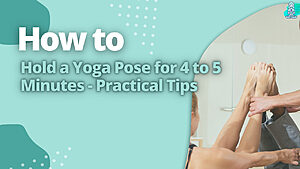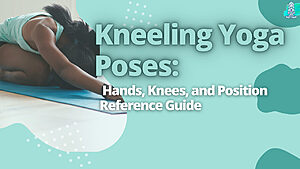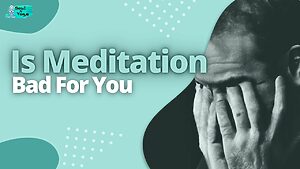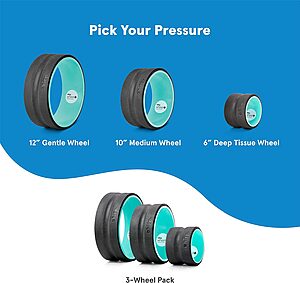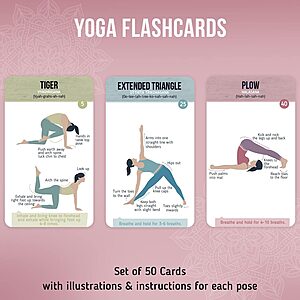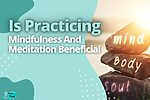The practice of meditation focusing on the present moment, or mindfulness, is becoming increasingly popular. As a meditation, you concentrate on your breathing and the present moment, allowing your thoughts to drift away.
Mindfulness meditation can lead to a happier and healthier life when practiced correctly. However, how often should you be meditating thoughtfully?
In this article, I’ll go through mindfulness meditation’s benefits and the recommended practice frequency.

Here’s The Answer To How Often Should You Practice Mindfulness Meditation
It’s best to practice mindfulness meditation daily, but if that’s not possible, then at least make it a habit to do so every other day. You’ll want to aim for at least 10 minutes per session and no longer than 30 minutes (or 15 if you’re new).
The ideal frequency of mindfulness meditation is daily, but the minimum frequency is three times per week. Start with 10 minutes for each session and work up to 20–30 minutes.
Furthermore, set aside a daily meditation schedule to keep up with consistency. Practicing mindfulness meditation is an exercise that builds mental strength. You build mental strength by practicing mindfulness meditation regularly.
When you practice, your mind gets more robust. Regular practice of mindfulness meditation makes the brain synapses fire more frequently. Still, you should start small and work your way up to a daily routine.
Is It Possible To Over Practice Mindfulness Meditation?
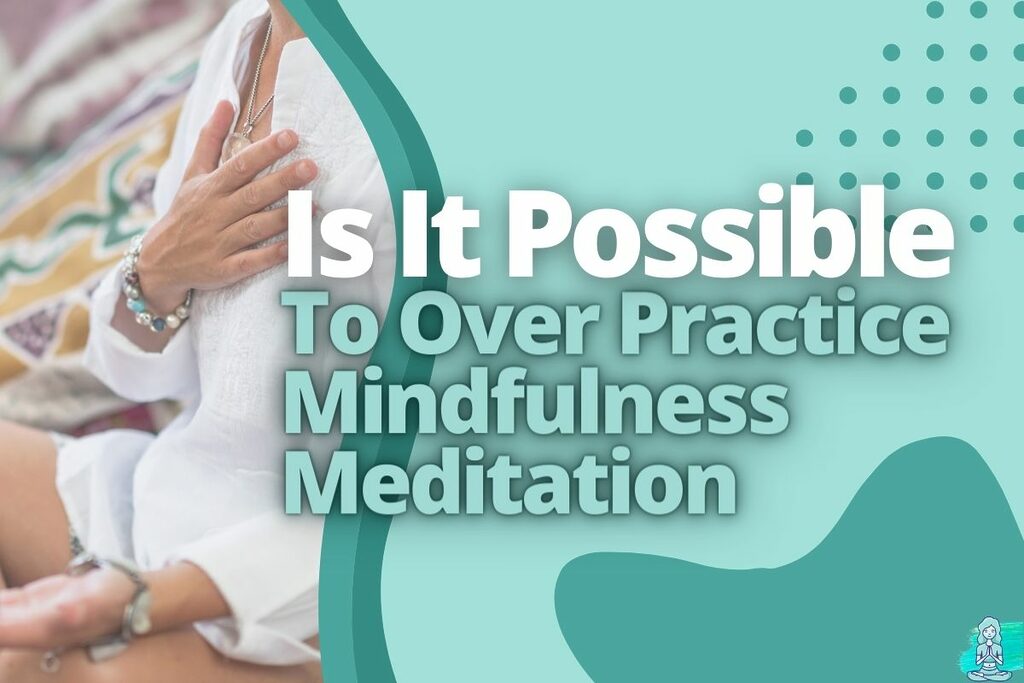
It is possible to over practice meditation. If you are practicing mindfulness meditation, it’s essential to know that there can be too much of a good thing.
While some people may think they are doing great by meditating for longer than usual or more often than their peers, this could harm mindfulness’s positive effects.
Over-practicing can lead to burnout, which means that your mind will become exhausted from the repetitive practice of focusing on one thing for long periods.
The best way to avoid over-practicing is by finding what works best for you, whether it be shorter sessions or less frequent ones, and sticking with it!
How Often Should You Practice Mindfulness Meditation If You’re New To The Practice?
If you’re new to the practice, experts suggest starting with 10-20 minutes of meditation daily. This can be done in a quiet place and at any time of day. The best times to practice mindfulness are in the morning or before your workday begins.
To practice mindfulness meditation effectively, you need to know your goals and how long you want to meditate.
Daily practice is a good start; you can practice for as long as you like. Some people find practicing for 20 minutes or more helpful, while others find shorter practice sessions more beneficial.
As a general rule, the more practice you put in, the more likely you succeed.
Is There A Limit To How Much Mindfulness Meditation You Should Practice?
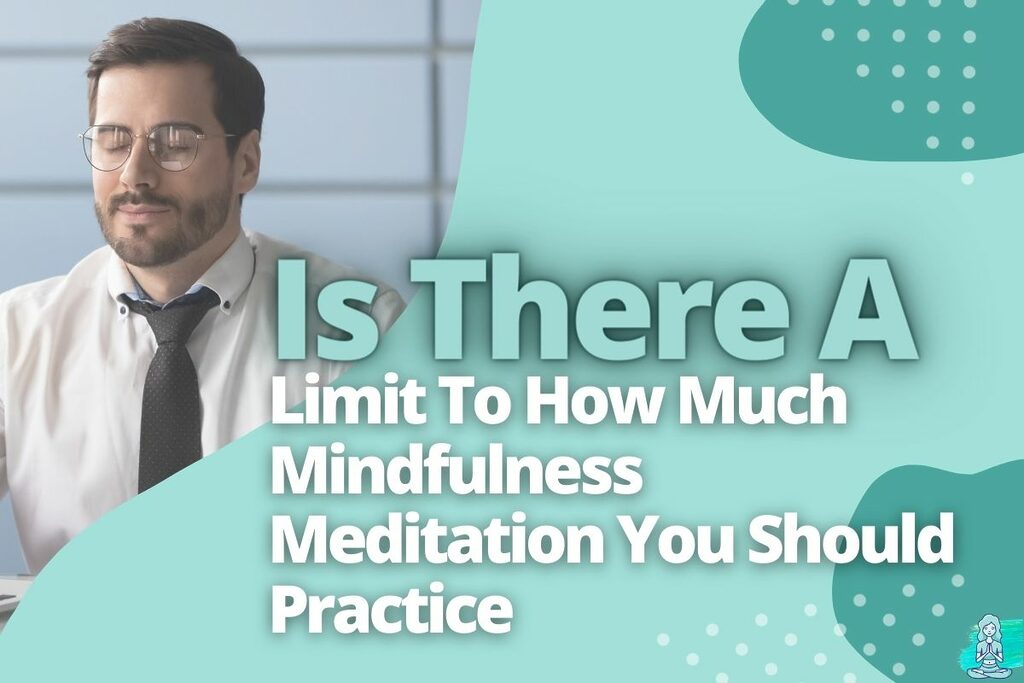
On the one hand, there is no limit to how much mindfulness meditation you can practice. When you practice, the more you will reap the rewards of your efforts.
On the other hand, it is crucial to find a balance between practicing mindfulness and living in the moment. If you find yourself meditating excessively, it may be time to shift your concentration to fully appreciate the present moment.
- However, if you’re a beginner, starting with shorter sessions is a good idea and gradually working up to longer ones. Mindfulness meditation has numerous benefits, including stress reduction, relaxation, and improved quality of life.
- Stress reduction can be achieved through the practice of mindfulness meditation. Meditation induces a deep level of calm known as the relaxation response.
When the body is in the relaxation response state, it is in a state of rest and repair. There is evidence that relaxation can reduce stress, increase sleep, and enhance immunity.
How Often Should You Practice Mindfulness Meditation On A Weekly Basis?
A resounding “every day” is the response to this question. Ideally, you should spend some time each day practicing mindfulness so that you can gain the full benefits of it.
Aim for three times per week if you can, but even once or twice a week can be beneficial if you can’t.
Consistency and dedication are more crucial than how much time you devote to your meditation practice. Don’t worry if you don’t have the time or stamina to meditate daily.
As long as you’re doing something that matters to you while meditating, you’ll be ready for anything coming your way.
How Long Should Each Session Be For?
The type of meditation you practice makes a difference. A typical mindfulness meditation session lasts anywhere from 5 to 20 minutes. However, some people choose to meditate for longer periods.
This is because they find it helpful to focus their mind on one thing for a longer period of time. However, if you think that would be too much right now, then it might be best just to stick with shorter sessions until you get used to them and can build up your routine.
In general, though, most people start with shorter sessions (around 10 minutes), then gradually increase their time as they get better at entering a state of relaxed focus during their practice.
How Can You Tell If You’re Over Practicing Mindfulness Meditation?
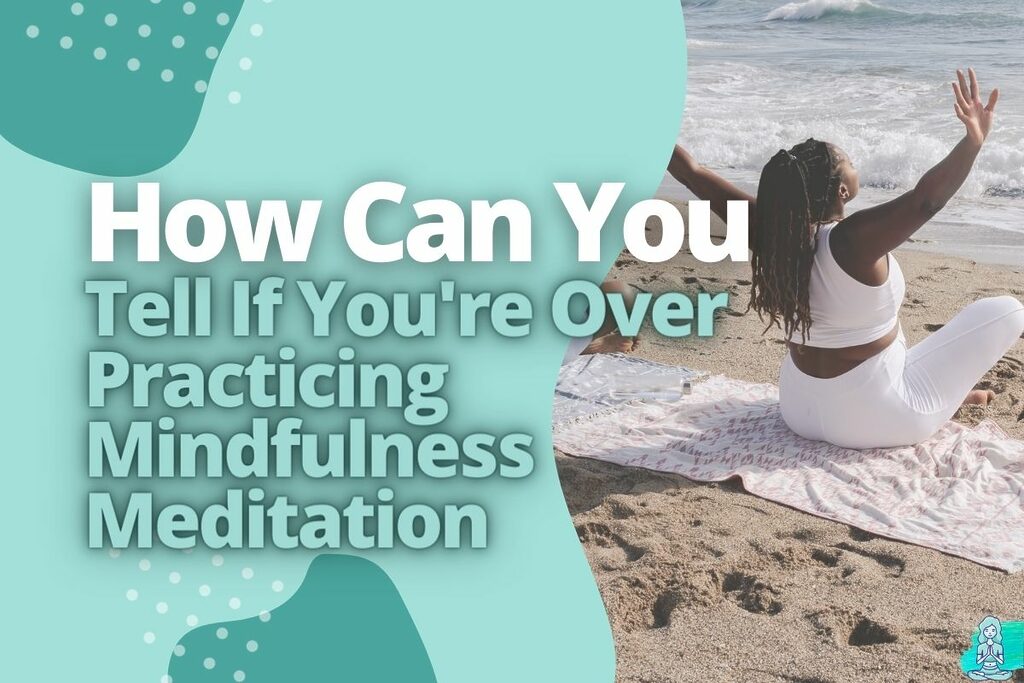
It’s essential to understand what exactly is meant by “over practice” in this case. When we say over-practicing, we are talking about the opposite of mindfulness meditation—meditation that serves no purpose and makes things worse.
If you’re not getting any benefits from your meditation, you could be overdoing it.
This means that if your meditation practice isn’t helping with stress or anxiety, then there’s a chance that you need to take a break until the benefits start showing up again.
If they don’t return after a while, it might be time to call it quits on regular meditations.
How Do You Know If You’re Practicing Mindfulness Meditation Properly?
- Focus. You should be able to focus on one thing, like the breath or a mantra.
- Let go of distractions. You should be able to stop thinking about other things and pay attention to what you’re doing at that moment.
- Be present and aware. When practicing mindfulness meditation, you should be present in the moment and aware of what’s around you (without judging those things).
Do Mindfulness Meditations Take Longer To Understand?
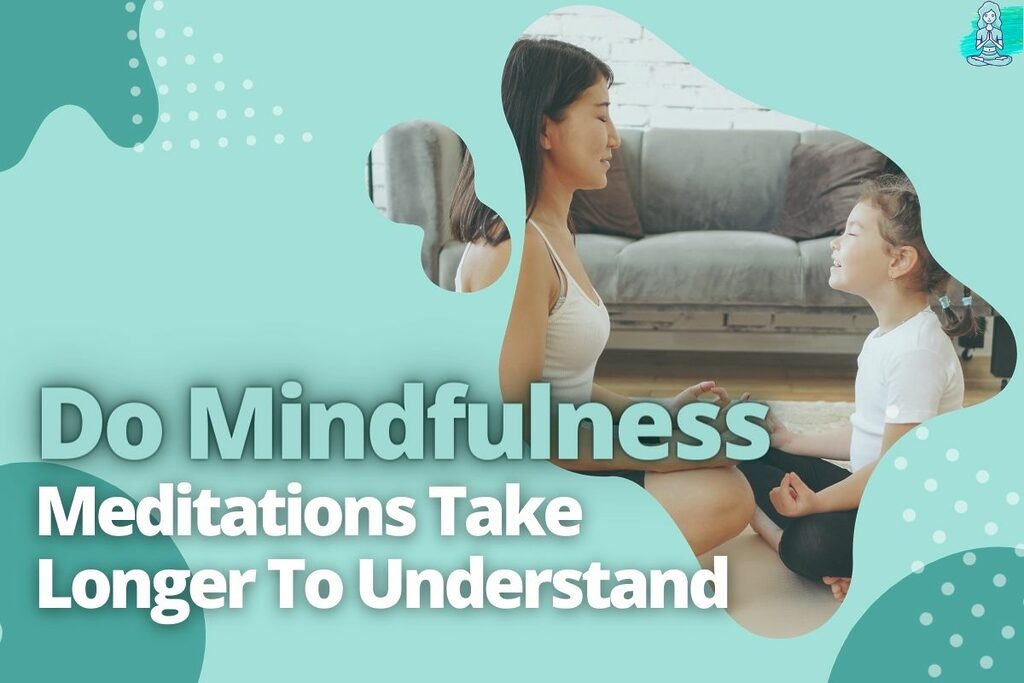
Mindfulness practices can be a challenge to master at first. Relaxation and learning how to let go simultaneously is a process that takes time, but it’s well worth it when it works.
If you are new to meditation, it is important to be patient and give yourself time to learn the basics. Some experimentation is necessary to identify the sort of meditation that is most effective for you.
Once you have found a mindfulness meditation practice that you feel comfortable with, you can start to explore the different ways to make it a part of your life.
Most meditation teachers recommend starting with a regular practice of 10-20 minutes daily. For most people, this is a reasonable timeframe to begin experiencing the health benefits of weight loss.
Many apps and online resources are available to assist you in establishing a regular practice if you are having difficulty doing so.
How Should People Practice Mindfulness Meditation?
- You should practice mindfulness meditation regularly. This means practicing for at least 10 minutes a day, every day.
- You should practice mindfulness meditation in a quiet place. A calm place has little to no distractions, such as other people or noises from outside the room where you’re meditating.
- You should practice mindfulness meditation in a comfortable position. Relaxed posture is optimal, with your feet flat on the ground and your hands resting on your knees or lap with palms facing either upwards or downward, depending on how you prefer to sit (depending on what feels most comfortable).
- The amount of time spent practicing mindfulness meditation depends on how long each session lasts before drifting off into sleepiness; generally speaking, five minutes per session should suffice until more experienced practitioners are comfortable extending their sessions longer than twenty minutes per sitting focus due to tiredness.
How To Practice Mindfulness Meditation Effectively?
To practice mindfulness meditation effectively, you need to know that it is more of an exercise in awareness than anything else.
It’s not about trying to achieve a state of bliss or transcendental Nirvana; it’s about being aware of your thoughts and feelings at any given moment.
There isn’t any right or wrong way to do this; you just have to go with the flow and find what works best for you.
As long as you stay focused on what’s happening in the present moment without judging it (or yourself), mindfulness will be effective for you.
How Difficult Is It To Practice Mindfulness Meditation?
Even though meditation isn’t difficult, it’s also not easy. It’s a skill that may be honed through repetition and study. Mastering this skill is possible.
For any new ability, there is an initial resistance before your mind becomes used to the process of paying attention in the present moment without distractions or judgment about yourself or other people.
Once you get past this stage, your mind will begin to settle into the habit of being present in each moment without effort because, once again, meditation is like anything else – it takes practice!
How To Prepare For A Mindfulness Meditation Session?
The first step is to set aside some time to practice mindfulness meditation. You can do this in any quiet place, but it’s best if you have a dedicated room or space for this purpose.
If your home doesn’t have a suitable layout, consider renting office space at a coworking space or renting out a conference room at your workplace.
Choose somewhere private where you’ll be free of distractions. Remove any potential distractions from your surroundings by turning off your phone’s notifications and ensuring no one is nearby.
It’s also important not to let hunger get into your meditation practice since hunger can cause discomfort and lead people astray from their goals during their sessions, so make sure you eat before starting!
How To Start Learning Mindfulness Meditation?
- You can start learning mindfulness meditation by doing regular practice. Doing it daily and following a set schedule is the most effective method to get started.
- You don’t need much time or any special equipment to practice mindfulness meditation. Sitting quietly for 20 minutes, paying attention to your breath, or taking a stroll in nature are all simple ways to practice mindfulness.
Conclusion
In this blog post, we discussed the benefits of practicing mindfulness meditation. We also discussed how often one should practice mindfulness meditation and how it can benefit their life.
Keeping a regular practice is essential to achieving these aims. We also spoke about how to make practice goals.
Regular mindfulness meditation is essential to reap its advantages, so don’t neglect it. Setting goals for one’s practice to keep an active and consistent approach is also necessary.
If you want more information on mindfulness meditation, you should check out our other blog posts on this topic.
Frequently Asked Questions
Will Mindfulness Meditation Make You More Productive?
The answer is yes. Researchers have found that mindfulness meditation can help people stay focused, be more aware of their surroundings, and experience less stress. In addition, practicing mindfulness can make you a more mindful employee by improving your communication skills and helping you work better with others.
Do You Need Any Equipment To Practice Mindfulness Meditation?
There is no equipment required for mindfulness meditation. Mindfulness is a state of active, open attention to the present moment. It can be practiced by paying attention to your breath via body scan or sitting and silently observing your thoughts and feelings.
Why Is It Important To Practice Mind mindfulness Mediation Daily?
Your mental health and well-being can be improved with the help of mindfulness meditation. In addition, it can help you deal with stress and anxiety, which are major health issues nowadays.
What is “mindfulness”, and what does it mean to practice mindfulness meditation?
Mindfulness is the practice of maintaining a moment-by-moment awareness of our thoughts, feelings, and bodily states. When we’re mindful, we’re fully immersed in the present – instead of lost in the past or future – and are more aware of our surroundings and what’s happening.
My name is Mugen Seki, and I’m a painter and yoga enthusiast who is passionate about bringing together art and exercise in ways that help people connect with their inner selves. When I’m not painting, I’m practicing yoga. And when I’m not doing either of those things, I’m usually thinking about them.
- How to Hold a Yoga Pose for 4 to 5 Minutes – Practical Tips
- A Guide to Finding the Perfect Yoga Mat for Carpet Floors
- Kneeling Yoga Poses: Hands, Knees, and Position Reference Guide
- Is Meditation Bad For Christians (The Surprising Answer)
- Is Meditation Bad For You (Don’t Believe Everything)
- Will I Get Better At Meditation (Understand The Secret)


